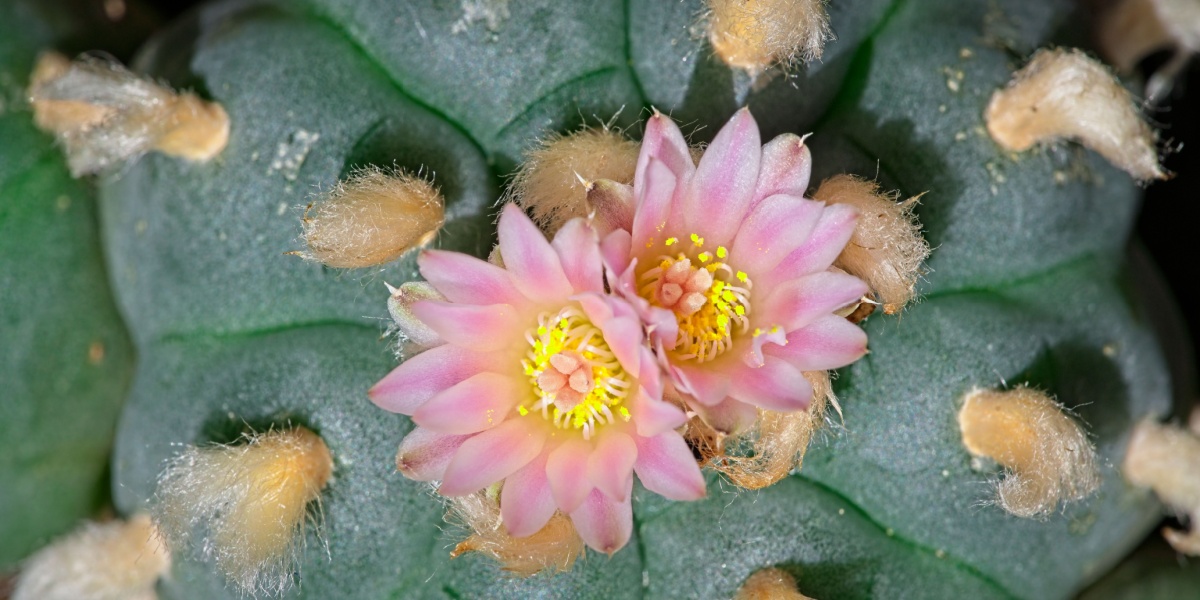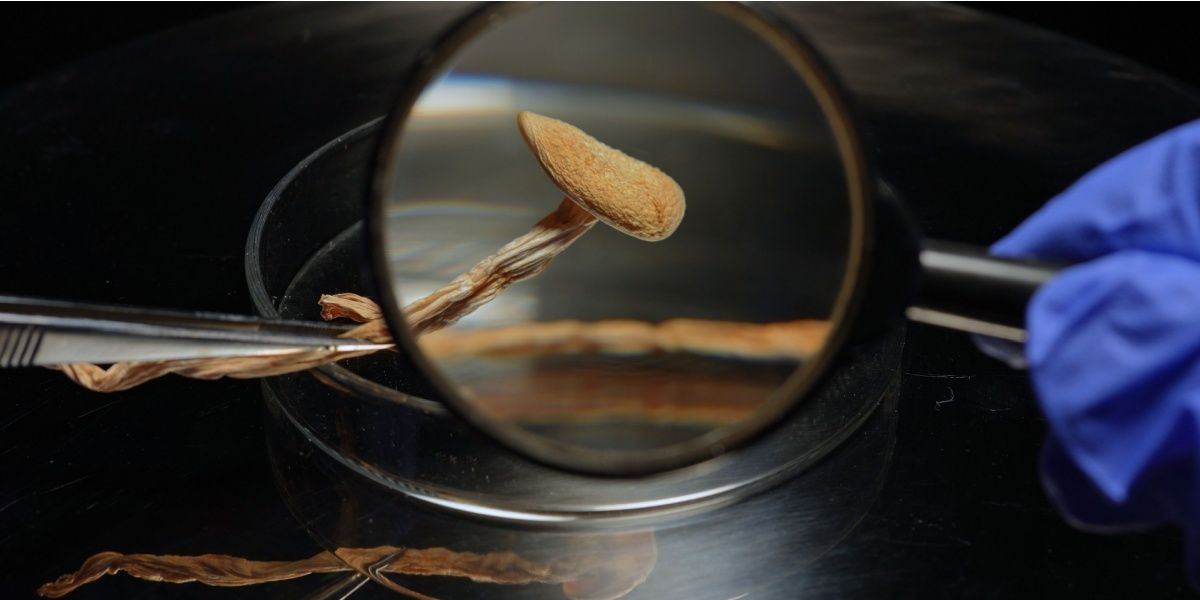Peyote (Lophophora williamsii), a spineless cactus native to regions of Mexico and the southwestern United States (Texas), serves as a revered sacred plant in its native region and a psychoactive substance. Its spiritual significance is deeply embedded in the religious ceremonies of Indigenous tribes, particularly within the Native American Church (NAC).
With its profound spiritual and healing significance, peyote has been a cornerstone of Indigenous cultures for generations. It has been used in rituals to support healing and facilitate meaningful inner experiences, bridging the visible world and unseen spiritual dimensions.
Peyote’s unique legal status has sparked an ongoing debate and raised conservation concerns for Indigenous peoples, mapping this unassuming plant's complex legal landscape.
- Peyote is a Schedule I controlled substance in the US, with a key exemption under federal law for religious use by Native American Church (NAC) members.
- Legal protections safeguard Indigenous peyote ceremonies, vital for cultural identity and intergenerational traditions.
- Declining wild peyote populations due to overharvesting and habitat loss have sparked debates over stricter harvesting regulations and the need for sustainable cultivation methods to ensure long-term access.

Is Peyote Legal? The Legal Status of Peyote in the US
Peyote is classified as a Schedule I controlled substance under the Controlled Substances Act (CSA) due to its mescaline (psychedelic) content, making its use, possession, and distribution illegal for most people in the US.[1] However, a necessary exemption exists for religious use, specifically for members of the NAC. The 1994 amendments to the American Indian Religious Freedom Act (AIRFA) formally safeguard this exemption, allowing NAC members to use peyote in religious ceremonies without fear of prosecution.[2]
The legal status of peyote remains controversial despite federal protections. In 1990, the Supreme Court ruled in Employment Division v. Smith that states could deny unemployment benefits to people fired for religious peyote use. This decision weakened protections and caused public concern. Congress passed the 1994 AIRFA amendments, which restored broader protections and exempted religious peyote use under federal law.[3]
Additionally, the federal government continues to monitor religious peyote use through legal mechanisms to prevent misuse outside authorized religious contexts. However, there is no clear evidence that peyote is habit-forming and may lead to addiction. Violating the law outside NAC exemptions can lead to criminal penalties, reinforcing peyote’s restricted status.
Federal law clearly protects religious peyote use, but state-specific laws, environmental challenges, and legal precedents make evolving legal frameworks complex and challenging.
State-level laws
Peyote laws vary at the state level. While many states follow federal exemptions for religious use, others have additional restrictions or permit peyote use under tightly regulated conditions. For example, Texas plays a central role in the legal peyote trade, as it is the only state where peyote grows naturally.
The state requires licensed distributors to supply peyote to NAC members, but concerns remain over declining wild populations and whether current regulations sufficiently protect long-term sustainability. Conservationists argue that stricter controls are needed beyond licensed harvesting measures to preserve peyote for future generations.[4]
Cultural significance and protection under the law
Peyote is central to the spiritual life of the NAC. It is used as sacred medicine in ceremonies that heal, guide, and connect the community. These practices keep Indigenous traditions alive and hand them down to future generations. More than a religious practice, peyote use helps preserve a broader sense of Indigenous identity, resilience, and solidarity.
US federal law recognizes this cultural importance through protections specifically for the religious use of peyote. Under legal provisions within 21 CFR § 1307.31, NAC members are exempt from criminal prosecution, although peyote is a Schedule I controlled substance. This protection allows Native American communities to safely perform their ceremonies without fear of legal interference or prosecution.[5]
Recent legal discourse has emphasized that these exemptions do more than protect religious freedom—they support the survival of Indigenous people’s systems and cultures. Employment Division v. Smith (1990) highlighted the vulnerability of religious peyote use when the Supreme Court ruled that neutral laws of general applicability do not violate religious freedoms, leading to public outcry and legislative action. Once again, the 1994 AIRFA amendments restored the exemptions, reinforcing peyote’s protected religious status.[3]
Current legal status of peyote in the US by state
Peyote’s legal status in the US is complicated. Federal and state rules overlap, creating a complex legal landscape across the country.
| State | Legal Status | Key Restrictions | Conservation Concerns |
|---|---|---|---|
| Texas | NAC use only | It requires state-issued distributor licenses; only NAC members can purchase them.[4] | Wild populations are declining due to overharvesting and habitat loss.[4] |
| California | NAC use only | It is strictly limited to religious use, and unauthorized possession is aggressively prosecuted.[6] | While there are no direct concerns, indirect risks are due to policy-driven demand. |
| New Mexico | NAC use only | There is lenient enforcement of laws, but non-religious possession is still a criminal offense.[6] | Limited concerns of supply exist, as peyote is sourced from Texas/Mexico.[6] |
| Arizona | NAC use only | Strict penalties are imposed for possession outside religious exemptions.[6] | While there are no direct supply concerns, potential indirect risks due to demand.[4] |
| Oregon | NAC use only | It is limited to religious peyote use only, recreational use is still illegal.[7] | No direct concerns supply concerns exist, but indirect risks are due to policy-driven demand.[7] |
Penalties for unauthorized use of peyote
Peyote carries strict penalties for unauthorized use, possession, or distribution. Outside of federally protected exemptions for the NAC, the possession and use of peyote are considered illegal due to its hallucinogenic/psychedelic compound, mescaline. People caught using or possessing peyote without authorization can face legal repercussions, depending on the quantity and context of the offense.[6]
Possessing small amounts of peyote can lead to misdemeanor charges, with penalties like probation or up to one year in jail. Larger quantities or intent to distribute the substance may result in felony charges, carrying longer prison sentences and significant fines. Texas, a primary source of wild peyote, enforces stricter sentencing compared to more lenient states, like New Mexico.[4]
Legal and ethical debates surrounding peyote
Legal issues surrounding peyote use remain highly complex, balancing religious freedoms, conservation efforts, and evolving drug policies. Various legal challenges and controversies have emerged as the landscape of psychedelic use shifts, creating tensions between Indigenous traditions, medical research, and broader access debates. The following sections explore key legal and ethical concerns.
Ambiguity in religious exemptions
Confusion over who qualifies for religious exemptions has caused ongoing legal challenges. In the 1991 case United States v. Boyll, the court ruled that peyote use could be protected for non-NAC members but only in certain religious settings.[8] This decision, however, offered limited protection.[9]
The push for non-native recreational use
The rising mainstream interest in psychedelics has brought attention to the idea of expanding legal access to peyote. Some advocates argue that limiting peyote access to NAC members is too restrictive, but Native American leaders strongly oppose recreational use. They emphasize that peyote is sacred and central to their culture and not just a psychoactive substance for recreational use.[5]
Conservation and sustainability concerns
The declining availability of wild peyote, particularly in parts of Texas and northern Mexico, is creating legal and ecological problems. Overharvesting and habitat loss are problematic for the future of peyote, even with current legal protections for religious use.
Experts warn that Texas’s licensed harvesting rules aren’t enough to prevent overuse or protect future supplies. Indigenous leaders call for sustainable harvesting programs and caution against over-commercialization risks. Some have proposed cultivating peyote in controlled settings, but this idea has divided opinions. Supporters see it as a way to protect wild peyote, while others worry it could lead to commodification.[4]
Medical research and the push for legal reform
Currently, peyote and synthetic mescaline, marijuana, psilocybin, MDMA, and LSD are all Schedule I drugs under the Controlled Substances Act, meaning that, according to the federal government, they have no recognized medical use. However, over the past 20 years, the surge in research on psychedelics as potential treatments for a variety of mental health disorders, including post-traumatic stress disorder, anxiety, depression, drug and alcohol addiction, eating disorders, and more, has resulted in efforts across the country to decriminalize these substances.[10]
As a result, support is growing for decriminalizing or legalizing mescaline for medical use. However, Native American groups caution that increased medical research could put additional pressure on wild peyote populations, threatening access for traditional religious use.[5] While there have been many significant strides in making psychoactive plants more accessible for use in medical, recreational, and research contexts in the US, the question remains of whether peyote should be included in the decriminalization movement.

-person-thumbnail.jpg?v=1758880627)
-guide-detail.jpg?v=1722502440)

